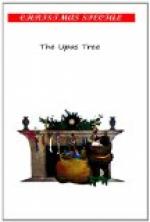Helen had smiled down upon him.
“I thought my cavalier was miles away from his horse and his wife, during most of the ride. But, if he proposes taking me on the same distant journey, he shall be forgiven. Also, I have something to tell you, Ronnie, and I see the turret clock gives us an hour before luncheon. I must scribble out a message for the village; then I will come to you at once, without stopping to change.”
She laid her hand on his shoulder, and dropped lightly to the ground. Then, telling the groom to wait, she passed into the hall.
Ronald left her standing at the table, walked into the sitting-room alone, and suddenly realised that when you have thought of a thing continuously, day and night, during the best part of a week, and kept it to yourself, it is not easy to begin explaining it to another person—even though that other person be your always kind, always understanding, altogether perfect wife!
He had forgotten to leave his hat and gloves in the hall. He now tossed them into a chair—Helen’s own particular chair it so happened—but kept his riding-crop in his hand, and thwacked his leather gaiters with it, as he stood in the bay window.
It was such a perfect spring morning! The sun shone in through the old-fashioned lattice panes.
Some silly old person of a bygone century had scratched with a diamond on one of these a rough cross, and beneath it the motto: In hoc vince.
Ronald had inveighed against this. If Helen’s old ancestor, having nothing better to do, had wanted to write down a Latin motto, he should have put it in his pocket-book, or, better still, on the even more transitory pages of the blotter, instead of scribbling on the beautiful diamond panes of the old Grange windows. But Helen had laughed and said: “I should think he lived before the time of blotters, dear! No doubt the morning sun was shining on the glass, Ronnie, as he stood at the window. It was of the cross gleaming in the sunlight, that he wrote: In this conquer. If we could but remember it, the path of self-sacrifice and clear shining is always the way to victory.”
Helen invariably stood up for her ancestors, which was annoying to a very modern young man who, not being aware of possessing any, considered ancestors unnecessary and obsolete.
But to-day the glittering letters shone out to him as an omen.
He meant to conquer, in this, as in all else.
It was curious that Helen should have chanced upon the simile of a distant journey. Another good omen! In hoc vince!
He heard her coming.
Now—how should he begin? He must be very tactful. He must break it to her gently.
Helen, closing the door behind her, came slowly down the sunny room. The graceful lines of her tall figure looked well, in the severe simplicity of her riding-habit. Her mass of beautiful hair was tucked away beneath her riding-hat. But nothing could take from the calm sweetness of her face, nor the steady expectant kindness of her eyes. Helen’s eyes always looked out upon the world, as if they expected to behold a Vision Beautiful.




